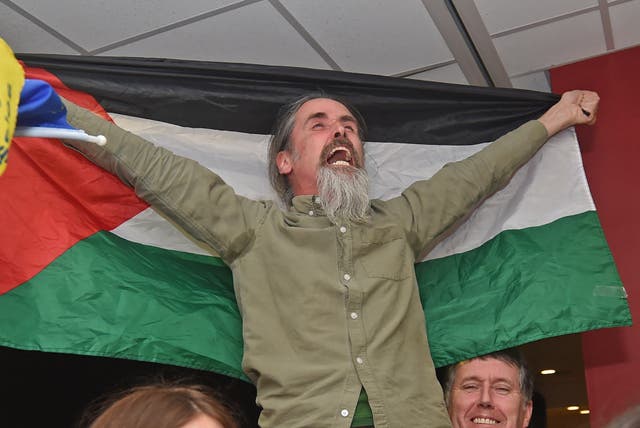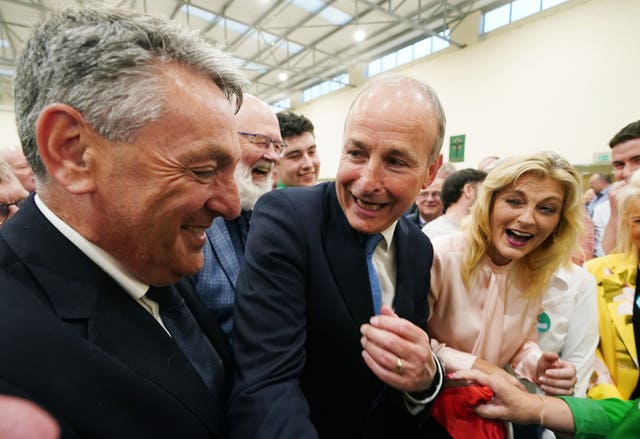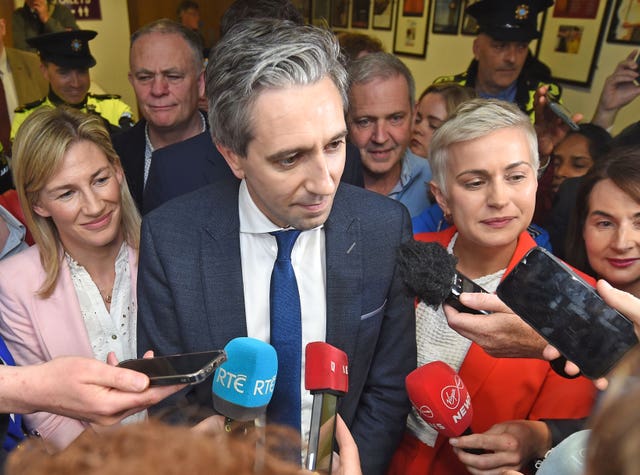Parties to assess results as dust settles on Irish local and European elections
Sinn Fein leader Mary Lou McDonald said the party had ‘not met the scale of our ambition’ in the elections held a week ago.

Political parties in Ireland are to assess their election performance after the main government parties claimed victory and the main opposition party said it would “learn and grow”.
Sinn Fein leader Mary Lou McDonald has said her party will be a “formidable force” in Ireland’s next general election, despite lacklustre gains after last week’s elections.
The Dublin parliamentarian admitted that they did not have the local and European election results they had wished for but had set down “solid” foundations.
Ireland voted last Friday to choose 949 local councillors, 14 MEPs and the country’s first directly elected mayor, in the first nationwide elections in four years.
Sinn Fein had hoped to significantly increase its number of councillors, but came back with just 21 extra seats.
It increased its number of MEPs from one to two, but lost its sitting MEP Chris MacManus.

Speaking at the launch of Sinn Fein’s UK general election campaign, Ms McDonald said “we did not meet the scale of our ambition”.
“But just to be clear, we come from the election with more councillors, with more MEPs, with very solid footing and foundation, with the determination to reflect and learn and grow, to regroup.
“And here we are, we’re fighting this campaign.
“And when the general election comes south of the border, we will be a formidable force, and we will present again the solutions to the problems that bear down on people all across the island.
“We talked about them here: health, childcare, the cost of living, all of these things, giving our young people in particular, the chance that they deserve at home to build futures here, or if they’re away, to come back home.
“All of that we will do with this spirit of confidence, but also the humility to know that each election is different, and you never take a result or a vote for granted.”
She was speaking after Ireland ended a marathon count of election ballots, with the final European Parliament constituency declared in the early hours of Friday.
In that constituency of Midlands North West, outgoing Sinn Fein MEP Chris MacManus lost his seat, while running mate Michelle Gildernew, a former Northern Ireland MP, came sixth in the five-seater.
“I am disappointed that she wasn’t elected,” Ms McDonald said.
Fianna Fail doubled its presence in the European Parliament to four, with Fine Gael also on four, down one from its previous showing in 2019.
Labour has one seat, the Independent Ireland party claimed one and two non-party aligned independents fill the remainder.
Dublin’s electorate selected Fianna Fail’s Barry Andrews, Sinn Fein’s Lynn Boylan, Fine Gael’s Regina Doherty and Labour’s Aodhan O Riordain.

Ireland South elected Fine Gael’s Sean Kelly, independent Michael McNamara, Sinn Fein’s Kathleen Funchion and Fianna Fail’s Billy Kelleher and Cynthia Ni Mhurchu.
Left-wing independent Luke “Ming” Flanagan topped the poll in Midlands North West, with Fianna Fail’s Barry Cowen, Fine Gael’s Nina Carberry and Maria Walsh, and Independent Ireland candidate and former RTE correspondent Ciaran Mullooly, elected to the constituency.
Five MEPs have lost their seats: Mr MacManus, the Green Party’s Grace O’Sullivan and Ciaran Cuffe, as well as independents Mick Wallace and Clare Daly.
Results from the three elections have been seen as a political boon for coalition partners Fine Gael and Fianna Fail, while the largest opposition party, Sinn Fein, has initiated a review after performing well below its own expectations.
The government has also hailed the European election results as a rejection of far-right candidates and trust in the main government parties.
Fianna Fail emerged as the largest party in local government after all seats in Ireland’s local election were filled.

Fianna Fail had 248 seats on councils, with Fine Gael close behind on 245. Sinn Fein was on 102 while 186 seats were held by independents.
Sinn Fein’s popular vote of 12% in the local elections is a dramatic turnaround in fortunes for the main opposition party, which emerged from the 2020 general election on 24.5%.
There was also disappointment for the Green Party, who fell to 26 council seats and lost both its MEPs; Green Party TD Marc O Cathasaigh said the party was “feeling pretty bruised”.
When asked about candidates from Fine Gael and Fianna Fail – the Greens’ coalition partners – attacking the Greens, Mr O Cathasaigh said parties can get left “in the dust when it comes to election time”.
“What I’m worried about – and I’m going to leave my coalition partners out of this – what does worry me is the use of the Green agenda as a sort of punching bag.”
The Labour party is down one to 56 councillors, while the Social Democrats’ share rose to 35.
The number of Independent councillors has also increased.

The results have fuelled speculation that the Government may look to call a general election earlier than the current projected timeline of spring 2025.
With the election of TDs to the European Parliament, there will be a need for several by-elections in the coming six months.
That has added to speculation that the Government may seek an autumn or winter election, rather than fighting several potential by-elections only months before the Dail is dissolved.
However, the leaders of all three coalition parties have all said they remain committed to the government going full-term.
Fianna Fail leader and Tanaiste Micheal Martin repeatedly stressed the results in the local and European polls do not necessarily translate to a general election.
“From my perspective, we start with a clean sheet tomorrow in terms of preparations for a general election,” he said, speaking from Castlebar overnight.
“We have to learn lessons from this campaign – where we’re weaker, where we could do better.
“And there are some very good examples of local elections: Westmeath a good example, Kilkenny, Cork city and county, and we’ll try and apply those templates of what worked in those areas to other areas where we didn’t do so well.”
Taoiseach and Fine Gael leader Simon Harris said he and other Government leaders had not had a discussion on the holding of by-elections, but added: “I certainly don’t fear by-elections.”
He said that Ireland had rejected the far-right candidates in the elections despite fears about a trend across Europe.
“In Ireland, I’m very pleased we have rejected many people who ran for the far right and wish to be MEPs.
“The people of Ireland have overwhelmingly rejected that.
“I think in every sense of the word the centre has largely held.
“At a European level, while we’ve seen different results across different countries from different member states, we have seen the EPP (Fine Gael’s political grouping) increase its number of seats.
“It’s not possible now to have a legislative majority in the European Parliament without the EPP.
“That’s a significant change since the last parliament.
“It would be my preference that we would build a coalition that would obviously not see in any way the extremes given influence in the European Parliament.”





